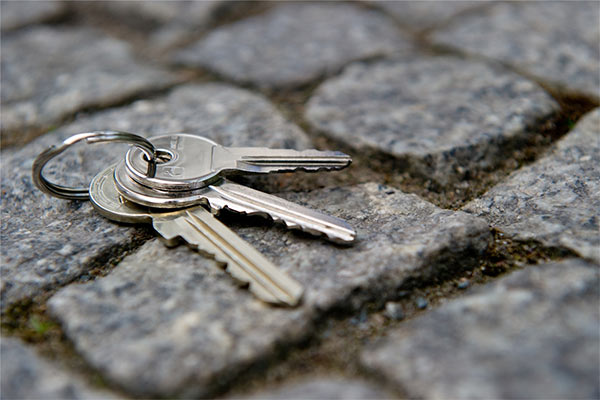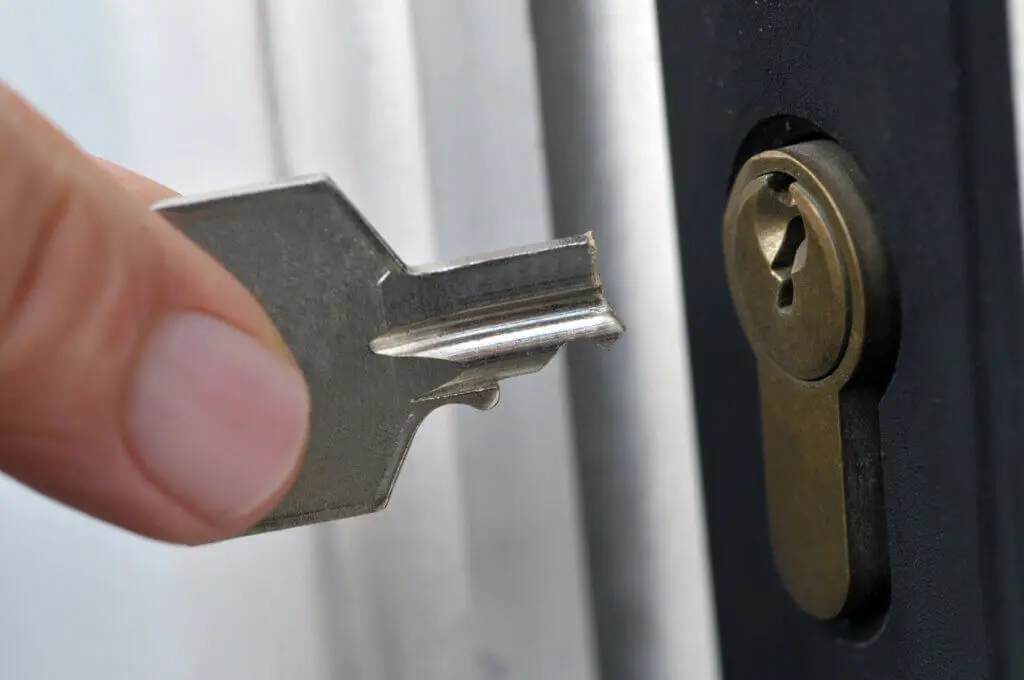Time and again, disputes arise between landlords and tenants over the question of who has to pay for the necessary locksmith service. The answer depends on the individual case.
Table of contents:
- Situations caused by the tenant
- Lost your key? You should be aware of this!
- Special situation: key theft
- Situations caused by the landlord
- Broken keys, defective locks
- Do you need a locksmith? This is how you should proceed!
- Your right
Situations caused by the tenant
You have locked yourself out and have no other way to get into your living quarters than with the help of a locksmith? In this case, you as the tenant pay for the service. The reasoning is quite simple: It is not your landlord’s fault that you left the key in the flat.
Tip: Before you call the locksmith, consider whether you can reach someone who lives in the flat with you, i.e. who has a key. Perhaps you have given a spare key to a good friend or a close family member for just such situations?
Lost your key? Here’s what you should know!
If you have lost your key, it is important that you take note of a few things. Since there is a chance that someone will find your key and use it, you should have your cylinder replaced by a locksmith. Even if the probability is rather low, the possible consequences are devastating. If they are tenants, the landlord must usually be notified as well. If they did not breach their duty of care when they lost it, it is even possible that the landlord will have to pay the costs.
locked out
Special situation: key theft

When keys are stolen, there is always a concrete danger that burglars will gain access to the premises. In houses with a locking system, this danger extends to all flats. If a burglary actually occurs and the tenant has failed to have the lock changed after the theft, his household insurance will not cover the damage either.
Conclusion: If the tenant has acted culpably or violated his duty of care, he must bear the costs of replacing the lock and, if necessary, the locking system in case of key loss and theft.
Situations for which the landlord is responsible
There are situations for which the tenant is simply not responsible. Of course, the loss of a key can also be considered such a situation. However, the landlord is definitely responsible if, for example, the key breaks off due to material fatigue.
Broken keys, defective locks
If a key breaks off, it will regularly have to be clarified whether the tenant has breached his duty of care. In most cases, however, the landlord will not be able to prove this. The courts rule quite uniformly in these cases and believe that, according to general life experience, it is due to material fatigue when a key breaks.
In the case of a technical defect caused by wear and tear, design faults or installation errors, for example, the landlord is regularly obliged to remedy the defect at his own expense. If it is necessary to call a locksmith for this reason, the landlord also bears the costs for this.
Do you need a locksmith? This is how you should proceed
No matter what reason you have for needing a locksmith – whether it is a lost key or a defect – the very first thing you should do is call the landlord or the caretaker. Ask them to instruct the locksmith. This is an effective way of protecting yourself against being stuck with the costs, even if the damage is not your fault.

You should and may only hire a locksmith yourself in an emergency. Such an emergency regularly occurs when you are standing in front of a locked door and cannot reach either the caretaker or the landlord (proof: proof of connection from your telephone provider). Such an emergency also exists if you are in the flat but the lock is suddenly defective and has to be replaced, if you cannot reach the landlord promptly.
In these cases, you can usually hire the locksmith yourself and then submit the bill to the landlord. The landlord is obliged to pay the costs even afterwards, unless you were at fault.
If your tenancy agreement contains clauses that prohibit you from doing this, they are not legally effective. Only the small repairs clause can apply here if the costs do not exceed the value specified here. However, these costs may only be incurred once a year and therefore do not apply to every case of damage.
Tip: The items covered by the small repairs clause must be listed in the clause. The clause is invalid if your landlord has failed to do so. And, of course, you do not have to pay the costs of so-called minor repairs if the item in question, for example a door lock, was not listed.
Your right
If your landlord does not want to pay the costs for the lock replacement and accuses you of a breach of your duty of care, you can kindly point out to him that door locks do not fall under the duty of care. Doors and door locks are in fact considered maintenance-free.
Conclusion: As a rule, you can pass on the costs of changing locks to the landlord. Only if you yourself have breached your duty of care (e.g. keys left unattended on the beach) are you liable. It is important that you always contact your landlord immediately. This is the only way to ensure that you are not left with the costs.
If you have problems opening your locks, our locksmith can help you. Call us on the telephone number on the website!
